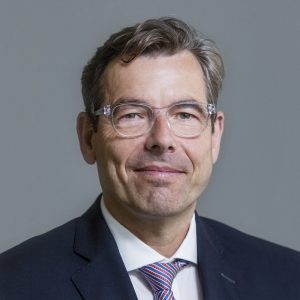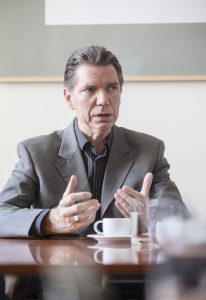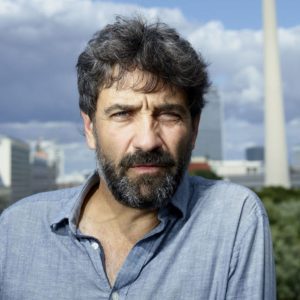DIE ZEIT: Although we will see not only the Ethnologisches Museum, but also the Berliner Stadtmuseum and the Humboldt Universität coming together under one roof at the Humboldt Forum, there has been only one question under debate in recent years: How do we deal with our colonial past – in particular, with items held in the Ethnologisches Museum that were acquired by questionable means? The Humboldt Forum has a certain responsibility to provide the whole nation with an exemplary response to the question of Germany’s involvement in colonialism
Lars-Christian Koch: This question is so wide-ranging that the Humboldt Forum will not, and cannot, resolve it. But we do want to be a platform for discussion. We want to use the work that we do at the Ethnologisches Museum to bring this very issue, which we as ethnologists have always had to deal with, into public discussion.
The public hasn’t been under the impression that the directors of ethnological museums were likely to be up front, and happy to share their findings with the public. In fact, it looked quite the opposite: that they were being driven.
Lars-Christian Koch: I’ve previously worked in the area of musical ethnology, where we naturally worked and interacted with communities of origin all the time. And we returned our recordings. For me personally, that’s a very important point: We are the Humboldt Forum, we can make the whole thing much more open. This aspiration was then intensified and heightened by external pressure, and this is what will characterise the Humboldt Forum in the future.
There is a public expectation: That only when the museums bleed will they have convincingly shown that they have heard the shot; and they will bleed only when they part with valuable pieces from their collection. That’s the symbolic sacrifice expected.
Paul Spies: Well, we at the Berliner Stadtmuseum are partners at the Humboldt Forum, but we have no ethnological objects, so we have nothing to give back. However, we will still be addressing the subject of colonial times. We will be telling the story of what came to Berlin, what Berlin did with it, and what went from Berlin out into the world. Our exhibition on the first floor forms a bridge between the outside world of the Humboldt Forum and the presentation of world cultures on the upper storeys. This is our way of repeatedly addressing racism and economic inequality. We will also be taking a close look at our collection. This will not be so much a question of plundered objects, but of materials.
Everything looks wonderfully Berlin-style, but where exactly does the wood come from, and how did it get to us?
Could you give an example?
Paul Spies: Our furniture collection. Everything looks wonderfully Berlin-style, but where exactly does the wood come from, under what circumstances was it acquired, and how did it get to us? We have exploited the world.
Hartmut Dorgerloh: To come back to the question of restitution: Restitution plays an important part, some has already taken place, and there will be further restitution of objects from Berlin, from Germany, and from Europe. But we must not allow them to be reduced to merely symbolic transactions. Restitution alone does not amount to a reappraisal of our colonial past. It’s a process. In our confrontations with the holocaust, and of the fates of people such as the Sinti or Roma people, we have discovered that this is an intergenerational process which cannot take place unilaterally. It is vital to work together with people who have other experiences, other survival stories, with the descendants of people who suffered under colonialism, and who naturally have a different perspective.
In the old Federal Republic, the whole raison d’être was the remembrance of the holocaust and the responsibility arising from it. I get the impression that this paradigm is currently being replaced with a new political remembrance paradigm: in awareness of its colonial crimes, Germany does what it does. Mr Spies, when you say, ‘We have exploited other countries’, that sentence encapsulates the new perspective on Germany as a colonial power.
Paul Spies: At the Berliner Stadtmuseum, we talk about global interconnectedness: It’s not Berlin’s fault, or Germany’s, but Europe’s as a whole.
Post-1945, the culture of guilt was a peculiarly West-German construct, a way to deal with the crimes of the Third Reich – and always with the presupposition of its singularity. My point is: there is now suddenly a second culture of guilt.
Hartmut Dorgerloh: Yes, and that’s a result of dealing with and understanding the issue on a global scale.
That’s an enormous moral and political reconstruction weighing on your shoulders.
Hartmut Dorgerloh: It’s overdue, and is already proceeding full speed ahead in our society as a whole. Also because we cannot be indifferent to what is happening in other parts of the world. If not before, then at least when it comes to topics such as sustainability, climate or security, we realise that these are global challenges. And one of the consequences is then of course that we deal with our own global past – as the West, as Europe, as Germany. It’s only logical.
Paul Spies: I come from the Netherlands, and exactly the same thing is happening there. A reappraisal of our colonial past is a central theme there too.
If we reappraise our colonial past, we also have to deal with current everyday racism.
What part can the Humboldt Universität play in this project?
Gorch Pieken: Research has provided, and continues to provide, an important impetus to society’s reappraisal of colonialism. If we reappraise our colonial past, we also have to deal with current everyday racism, which often has its roots in colonial times. Unfortunately, when the first German colony was founded in 1884, no-one had the Humboldts in mind, otherwise things might have turned out differently.
Will the Humboldt Lab also be conducting a critical self-examination?
Gorch Pieken: Absolutely. We will also be confronting issues with our own collections and their colonial links. For example, if we exhibit Robert Koch’s Nobel Prize certificate, we will address the fact that in the year it was awarded, he had just been in East Africa conducting medical experiments on people.
When we work together with the communities of origin, that has a political effect on these communities.
What kind of experiments?
Gorch Pieken: In connection with sleeping sickness in the indigenous people – sometimes with fatal consequences. Even our greatest and most famous object, our sound archive, is under critical scrutiny. The sound archive’s founder wanted to establish a museum of world languages. There is a dialect collection, and a collection of prominent voices, but the recordings from the prisoner of war camps during the First and Second World Wars were taken under duress, and the scientists were working from a colonial standpoint, founded on the theories of race common at that time.
Hartmut Dorgerloh: I’d like to complicate the issue even further. When Paul talks about Berlin, I always talk of two Berlins. The moment we begin grappling with issues regarding Africa or Asia, we expose a difference between the two Germanys. In the GDR, we believed ourselves free of the guilt of colonialism; after all, we had been on the side of the emergent national liberation movements, while the ‘imperialists’ ruled the West. It is important the Humboldt Forum make clear that there was and is more than one perspective in Germany.
Lars-Christian Koch: In that case, let me expand the theme even more …
Hartmut Dorgerloh: … even more?
Koch: Yes, if we are reappraising our own history, and that includes working with the communities of origin, that has a political effect on those communities. For example, if we work together with a small community in Costa Rica, that community develops a much stronger identity in that location compared to neighbouring communities from whom we have no collection. That is to say: we alter the political situation.
Can you put that in more concrete terms?
Lars-Christian Koch: We were with the Boruca in Costa Rica – we have two masks dating from 1906 that were acquired from them. They would like to have them returned, as they no longer have any. So, we travelled to visit them, and first we asked the simple question: why? What is behind this? At that time, the masks were made specifically to sell. But no-one had kept any examples for themselves. Their interest was not so much in having the objects returned, but rather in recovering the knowledge of how to make them.
What does it actually mean for a global museum to always use indigenous groups to represent these distant countries, as though there were no normal contemporary life there? It would be a little like going to a world culture museum in Lagos and seeing a Schuhplattler slap dancing group representing the whole of Germany. I mean, you could do that, it’s a great dance, but is it really Germany?
Hartmut Dorgerloh: It’s exactly the same in a museum in Japan: Germany is represented by Lederhosen and a beer stein, perpetuating the cliché. Our mission, however, is to show what is happening now in the Amazon, for example – politically, socially, economically and culturally. The bush fires in Australia are an issue equally close to our hearts. It’s the destiny of the collections to inspire us to grapple with the questions that move us today. The question is always: Why is this relevant today? And for whom? And that can only be done in collaboration with the communities of origin, which may end up with a completely different result from the one expected. At the end of 2021 we will be opening an exhibition on the Omaha, a First Nation in Nebraska. The objects from the ethnological collections that we intend to exhibit as the fruits of our collaboration with that community were collected together in the 1880s by the Omaha themselves and sold to Berlin. Their thinking was: These things must be saved, because soon we will no longer exist. Fortunately, that turned out not to be the case. And for that reason, the message today is: We are still here, our culture is still here, our language is still here! And objects from our own history still exist.
To market an institution like this, you need key words. At the beginning, the central key word was cosmopolitanism. Now it’s colonialism.
Lars-Christian Koch: I would say that cosmopolitanism has been complemented by colonialism.
Paul Spies: I can live with being post-colonial.
Hartmut Dorgerloh: At any rate, there has been a learning process. We don’t want to explain the world – we want to stimulate a broad public to ask questions, including all those who don’t have the first idea of what is hiding behind the Palace’s façades. And we want to do it from a global perspective. What kind of a world do we want to live in? What part does science play in that?
Gorch Pieken: What binds us together is our differences – we are very different partners. And that gives rise to something in this building that cannot be assumed in other cultural venues: a reflexive interdisciplinary approach. That’s how we negotiate contradictions amongst ourselves.
So, tell me about some of the contradictions among your partner institutions. What are the crucial points that challenge you?
Gorch Pieken: We see ourselves as a forum, not a museum, and yet we have some prominent museums in the building. When the Ethnologisches Museum opens in a year’s time, it will be as a world-class establishment, in the top tier of museums. The Humboldt Lab, in contrast, makes its contribution to demystifying the cultural model of the museum. We do many things differently compared to the usual practice in museums. We allow people to touch objects, to move them, to turn them around. We replace the old museum formula of placing everything along a wall with thinking in networks.
The Humboldt Forum is not a museum.
When you describe the Humboldt Forum, you often use words such as multiplicity, diversity, transdisciplinary, post-colonialism. Doesn’t it create a burden, to endow a museum with such a powerful moral and educational mission?
Hartmut Dorgerloh: The Humboldt Forum is not a museum.
Paul Spies: Our continuum is our collection. Each decade looks at this collection afresh. Of course, that’s zeitgeist, but there is nothing I can do about that – I can’t carry on behaving as if we were still living in the sixties.
Which exhibition will the Humboldt Forum open with, and when?
Hartmut Dorgerloh: We will be opening in three phases, from September with the first two storeys, the Humboldt Lab and the Stadtmuseum, and with the first of our special exhibitions, which include themes such as ivory, elephant and human. Besides these, there will be the Schlüter Courtyard, catering facilities and shops, and – most importantly – History of the Site, from Dominican monastery, via Palace and Palace of the Republic, to today.
When do the Ethnologisches Museum and the Museum für Asiatische Kunst open?
Hartmut Dorgerloh: Not until the second phase with the west wings on the second and third storeys, in spring 2021, in the second quarter. It all depends on being able to get all the numerous exhibits into the building after construction is completed this summer. Then the roof terrace and restaurant will be opened. The third and final phase comes at the end of 2021, when further parts of our collections will be available to view in the east wings.
Is there still anything that could go wrong with completion of the construction this summer?
Hartmut Dorgerloh: We know the challenges we have yet to resolve. We’re on the home straight, and I’m working on the assumption that we’ll not run out of breath.
When you have the grand opening of the first phase, what would you like people to judge you on?
Hartmut Dorgerloh: The building is vast, and the provision so diverse that it would be good to start with just a fraction of it, I must make that clear. Also, that particular themes which the public are expecting – such as the critical analysis of German colonial history in Africa – will not be arriving until spring 2021. The Humboldt Forum is beginning to blossom – and when you see a bud, there is still some time yet to wait for the apple.
This article first appeared in DIE ZEIT No. 11/2020, 5 March 2020.


